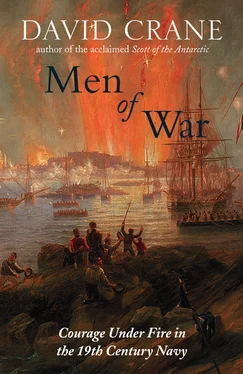Howe was no more tolerant of Gordon’s generalship than he was of the Greeks, and the next day only reinforced his doubts. As soon as it was light the Karteria again steamed into the cauldron of the harbour, and boldly anchoring within musket range of the shore, resumed her solitary and futile small-arms and artillery duel with the heavily reinforced Turkish defenders. ‘The Turks would only poke out their heads, fire their musquets, and retire,’ Howe complained, vividly capturing the intense physical intimacy of Greek warfare, ‘but one of them held out his head long enough for me to take aim at it and level him with a rifle-ball; he fell sprawling upon his face, and I hardly know whether pleasure or pain predominated in my mind as I witnessed his fall.’
After another two hours of shelling a signal came from Gordon to retire, and as Hastings ordered ‘up anchor’ the battle developed into a desperate race for the harbour mouth, with cannonballs ‘whizzing about and striking the ship in all directions’ and a force of cavalry dashing along the western shore of the port to cut off their retreat. ‘Soon we were moving,’ Howe recorded;
the enemy saw it, and galloping rapidly down to the narrow part of the port, awaited us. Among them were many Delhis , with their tremendous long caps, I should think at least two feet and a half high. I plied my rifle as fast as possible, and luckily was not called to for one single wounded man, they being sheltered by the high sides of the vessel … Our retreat was necessary, because we could not possibly do any good by remaining, but I could not help feeling shame as we moved off from a pursuing enemy hooting at us, and this in plain sight of the Greeks in the Acropolis and upon the hills.
A small dent in philhellene pride was neither here nor there – jeers and insults were as ritual a part of Turko-Greek warfare as breaches of faith or severed heads – but elsewhere in the battle it was a different story. ‘The Turks from the monastery cried out to our men that the troops under Vashos and Bourbakis had been completely routed,’ Howe continued.
This I fear may be true. Vashos is an experienced Greek soldier and knows the paliikaris completely, and probably did not suffer much … But Bourbakis is fresh from France, full of French notions, and though born a Greek, knows them not. He talked confidently of what he would do; nothing less than taking Kiutahi alive would satisfy him – and such nonsense. He is brave, and probably ventured upon the plain; the cavalry came upon him, his men ran away, and he was killed or taken prisoner; this we fear, but know nothing certain.
The reports were true – Vashos’s ‘poltroons’ had fled, Bourbakis was captured and beheaded for his pains, more than four hundred of his regulars slaughtered – and with one army defeated the Turks were now free to unleash the full weight of their cavalry and infantry against the Greek-held heights of Phaleron. After the mauling the Karteria had received in the first exchanges Hastings might have done well to stay out of it, but these were precisely the kind of operations for which his vessel was designed, and as his men watched successive waves of Turkish attacks climb and break against the Greek defences, he again ordered her to drop anchor within ‘short musquet-shot’ of the Ottoman rear and open up with grape.
With the Karteria ’s arrival the whole focus of the battle suddenly shifted from the heights to the shore. From her deck Howe watched a dozen men dragging a gun down to the water’s edge, and within moments a shell had ‘burst amid twenty of us. I expected at least four or five would have been killed, but my attention was drawn by the shrieks and cries of a drummer boy. I saw him fall, terror and despair in his countenance; seizing him in my arms, I carried him below …’
The whole of the Turkish artillery was now turned on the Karteria , and as ‘the balls … began to whiz about the ship, to strike her sides, cut her cordage etc’, their position became increasingly desperate. The ship’s guns had rapidly dealt with three of the enemy’s cannon, but two howitzers cleverly sited behind the walls of the monastery soon had their range. ‘I am told it was a rich scene to behold the mixture of dismay and gloom alternately reddening and whitening the cheeks of some of the Greek sailors,’ wrote the English philhellene Thomas Whitcombe, impotently ‘curling and twisting [his] mustaches’ and ‘biting [his] lips with vexation’ up on the heights,
as the worrying batteries’ pitiless storm pelted in every direction round their vessel; – the jolly reefers wishing themselves all the while in the territories of Prester John, or any other outlandish quarter of the globe, rather than where they had found themselves. The hair-breadth escapes on board the Karteria were … almost past belief, – flogging the doctrine of chances with unsparing thong … Our maledictions, loud and deep, were denounced on the heads of those Europeans [servicing the Turkish guns] – Christians they presumed to call themselves! – who could thus unshrinkingly stain their name and birth-place with the indelible disgrace of pocketing the Seraskier’s blood-steeped wages, in requital of tendering their arms and knowledge in aiding the suppression of the hallowed warfare of liberty and the blessed cross.
Up on the heights the battle was more or less won, and with the crew wilting and his boats shot to bits, Hastings’s only thought was to extricate the Karteria while he still had the chance. ‘To our dismay,’ though, wrote Howe, back on deck after tending to the drummer boy – only very slightly wounded, as it turned out,
on the word being given to start the engine it was found not to move. There was repetition of the order; it was shouted, but in vain; the engine would not start. Many a cheek blanched and many a lip quivered, for we were in a narrow port, exposed on every side to musquetry, and could see the enemy bringing down more cannon; to make it more dreadful, the anchor had been cut away, and it was whispered to me by the lieutenant that the ship’s head was aground, – and she only a pistol-shot from the shore. The enemy apparently perceived this, and shouting and waving their sabres, they began to rush down, expecting to have us in a few minutes. I must say that a feeling of bitterness and almost agony came over me for a moment at the sight of these barbarians, who I expected would soon be mercilessly hacking us to pieces.
The one man on board who seemed unmoved by the danger was Hastings, and with ‘much coolness and skill’ he brought his frightened crew to order. For a few endless moments the Karteria ’s fate hung in the balance, and then – very slowly – the engine began to move, the wheels turned back, the ship’s head swung free and – ‘Thanks to Mr Aeolus,’ as the watching Whitcombe put it – the sails filled, and Karteria fought her way out through the narrow mouth of the port and into open water.
It had been touch and go, but the escape of the Karteria added the final touch to a day that had seen the Greeks put up their finest display in fixed battle of the whole war. It is arguable that only an Ottoman general could have ordered the attack on so formidable a position in the first place, but the casualty figures for the action – some three hundred Turkish dead to only fifteen Greek – had as much to do with the courage and defensive skill with which the Greeks fought behind their tambouris as it did with Ottoman obduracy and contempt.
In a sense, however, that was the problem – the Greeks had their bridgehead and the Turks had Athens – and faced with an inevitable stalemate and endless political dissensions, Gordon did what he should have done before the landings and resigned. He had at least kept his army intact, but that was all. The Acropolis, with Colonel Fabvier imprisoned inside it, was no nearer being saved; the Greek captains, euphoric at their ‘victory’, were no nearer to trusting Western tactics; and the Karteria no nearer to proving the decisive element in the war that Hastings had promised. It had not been a good campaign for philhellenism.
Читать дальше











